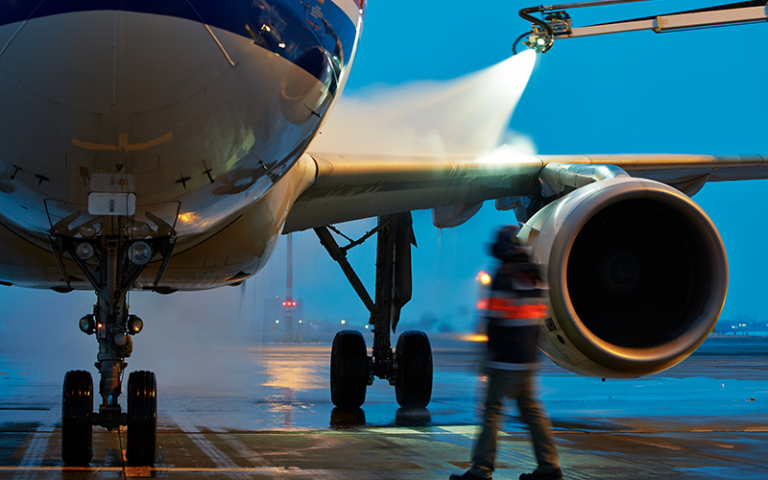Improving aircraft safety in icing conditions
UCL research has helped improve aircraft safety in icing conditions by using mathematical modelling to assess the impact of supercooled water droplets on icing on aircraft wings and rotors.

12 April 2022
Professor Frank Smith’s research at UCL Department of Mathematics over two decades has developed and applied mathematical models to understand and resolve the droplet/surface impacts in aircraft icing by focusing on the modelling and analysis of large droplets.
The models include realistic scenarios that take account of droplet size, fluid state, irregular geometry of droplets and crystals, air/water interactions and ice-skimming.
When supercooled water droplets in clouds freeze onto a plane wing, they distort the wing’s effective shape and can drastically affect the plane’s performance. Such icing can have catastrophic consequences causing planes to crash when ice builds up on the wings during conditions such as freezing rain.
The modelling has informed the design of aircraft and ice protection systems, resulting in improved aircraft safety through an ongoing collaboration between the UCL team and AeroTex. AeroTex supports aircraft manufacturers, airframers and systems suppliers in gaining icing certification for their products by providing accurate simulation tools.
In one of several collaborative projects, AeroTex implemented methods developed by Professor Smith and his team to quickly and accurately calculate heat transfer coefficients over a range of aircraft shapes and airflows. This has helped design decisions including heater positions, power, and scheduling.
This enabled AeroTex to model a wider range of scenarios and physical dynamics and apply them to a diverse range of air vehicles, from helicopter rotors to large commercial aircraft, for customers in Europe, Asia, and North America. This advanced modelling has increased AeroTex’s commercial performance and has significantly reduced costs for its customers.
Through industrial placements, the team’s research has enhanced AeroTex’s modelling capabilities and provided computational codes for ice growth, ice crystal impact, splashing, disintegration, and particle trajectories within the company’s modelling framework for complex icing problems. It has also helped ensure designs fulfil regulatory requirements, has improved productivity, and positioned the company as experts in the airplane icing industry.
Professor Smith said: “Accurate information on the accumulation of ice on aircraft flying through cloud (at or below freezing temperature) is crucial for planes’ performances, such accumulation having been a significant factor in a number of accidents.”
Research synopsis
Improving aircraft safety in icing conditions
UCL applied mathematics research has helped improve aircraft safety in icing conditions. The mathematical modelling to assess the impact of supercooled water droplets on icing on aircraft wings and rotors has informed safer aircraft design, allowed plane manufacturers to meet rigorous regulatory standards and ensures aircraft operate safely in icing conditions.
Links
- Professor Frank Smith's academic profile
- UCL Department of Statistical Science
- UCL Department of Mathematics
- UCL Faculty of Maths & Physical Sciences
- UCL Faculty of Maths & Physical Sciences REF 2021
Image
- Image credit: iStock/ Chalabala
 Close
Close

